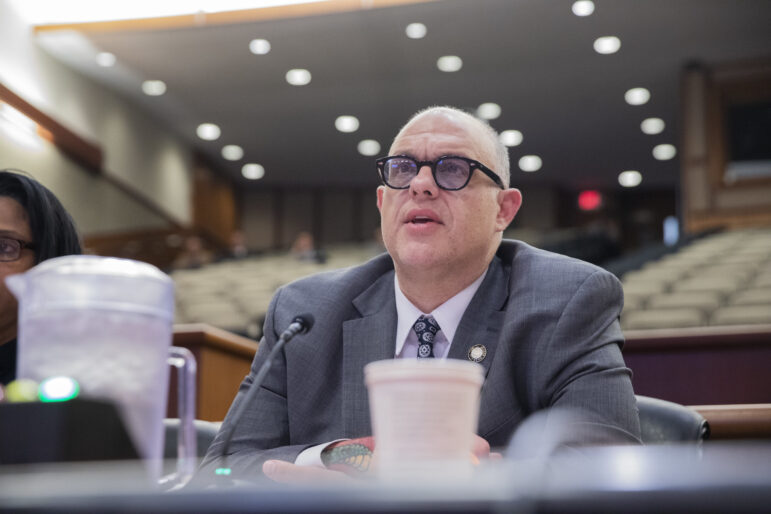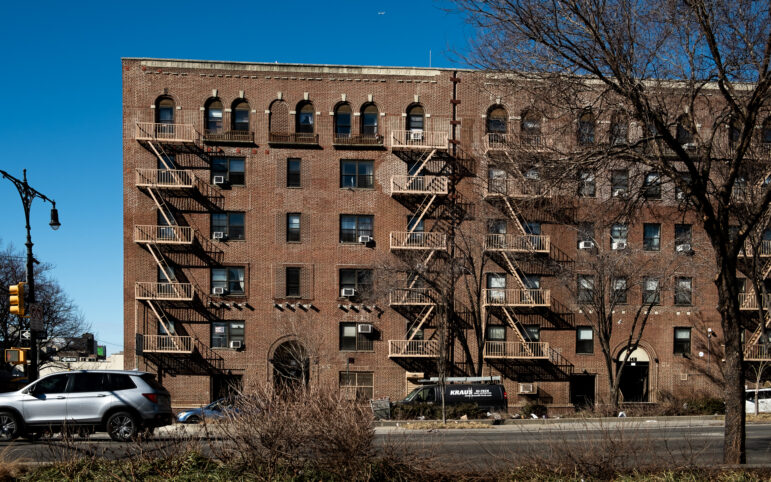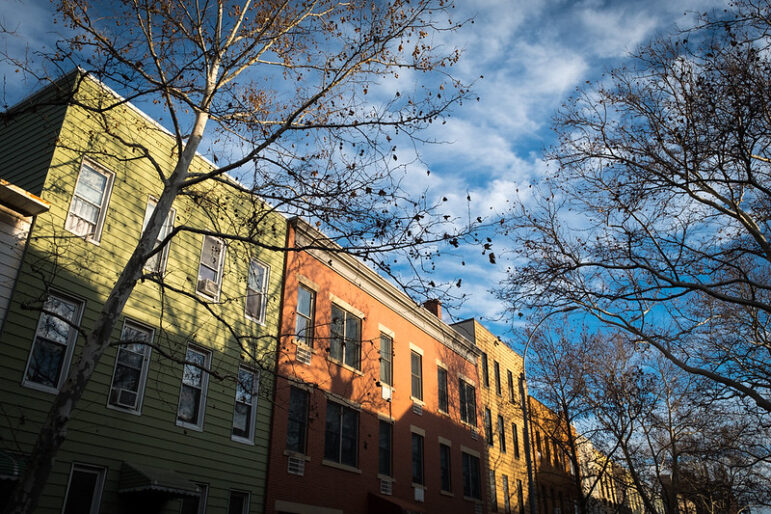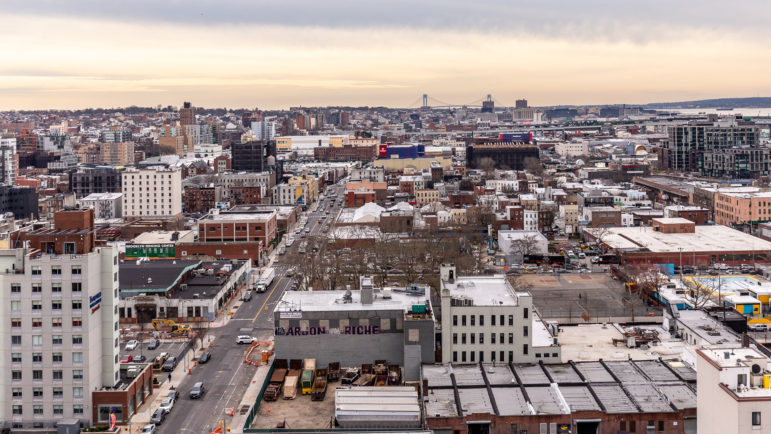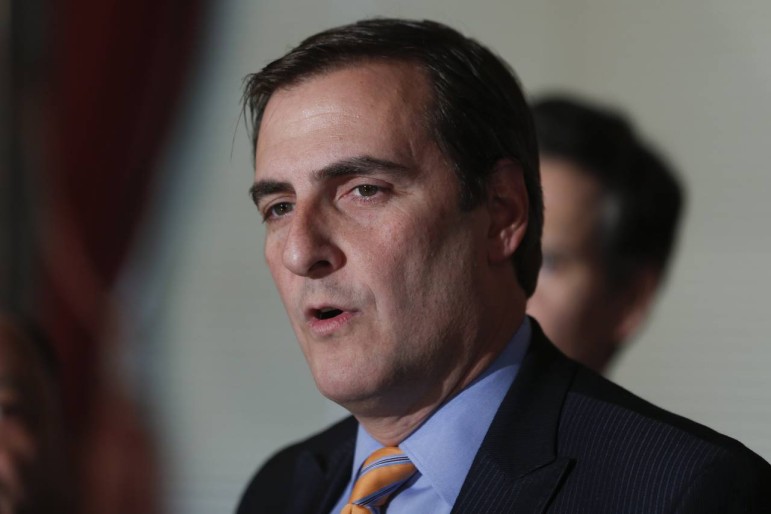
Office of Sen. Gianaris
Sen. Michael Gianaris says his proposal would correct a basic injustice in the current system: the fact that pre-trial freedom can depend on how much money you have.
The politics of bail seemed to shift Friday when Mayor Bill de Blasio called for bail laws to be strengthened so judges consider public safety when deciding whether and how to release a defendant before trial. The move came three days after the murder of a police officer.
But Sen. Michael Gianaris, a Democrat from Astoria, says a longer view shapes his feelings about the bail system: “It’s increasingly anachronistic that we’re living in the 21st century with a system developed in the Middle Ages when people’s idea of justice was burning people at the stake.”
Once an obscure issue, bail reform has become a cause célèbre in the past year. Mayor de Blasio ended the use of bail in cases involving minor misdemeanors. Council Speaker Melissa Mark-Viverito established a fund to start paying bail for some defendants. The state’s chief judge, Jonathan Lippman, imposed new policies to reduce the use of bail. The New York Times featured the issue on the cover of its Sunday magazine.
But few reformers have proposed anything as ambitious as Gianaris, who has introduced a bill that would eliminate financial bail altogether. Courts would operate with a presumption that prisoners would be released on their own recognizance awaiting trial, but judges would have two other options: remand to jail for prisoners who can’t be released at all, and release under conditions for others.
“The system we have now is clearly—by definition—biased toward the wealthy and allows people to purchase their freedom and the ultimate consequence of that is that the poor are effectively sentenced to jail purely for the reason that they’re poor,” Gianaris says.
Growing calls, shifting politics
Although widely misunderstood as a form of punishment—hence the outrage when “low bail” is set in high-profile cases—bail is designed solely to get people released before trial to show up for court. In New York City, most people are released without bail but each year many thousands are held because they cannot put up the money or a bond to get out.
As a 2007 City Limits investigation revealed, that results in people being detained for days or longer, missing work or school and away from their families, before they are found guilty of anything. Some defendants plead guilty solely because their sentence will be shorter than the wait for trial if they are detained on bail.
De Blasio’s announcement on Friday didn’t signal an abandonment of his administration’s efforts to reduce bail-related injustices, which include the launch of a Bail Lab to experiment with alternative approaches. Bail reformers have often sought to add public-safety to the bail decision to give judges more options, along with other changes to reduce the overall use of bail.
“The death of Officer Randolph Holder was a clear and tragic signal that we must ensure dangerous individuals with long criminal histories do not walk our streets. Yet as the law stands, judges can only consider risk of flight when determining a bail amount,” the mayor said. “Our judges must be able to look at how dangerous someone is when they decide how much bail is set – and should look at these factors when they decide whether to divert someone away from jail.”
A City Hall statement noted that Tyrone Howard, the man accused of killing Holder last week, paid $35,000 bail after a recent arrest. “Howard had an extensive history of drug felonies and misdemeanors. The judge could have made a different bail decision if he were able to consider Howard’s extensive criminal history as an element of dangerousness,” the statement added.
Many praised the mayor’s move. But some critics believe it ignores the reality that plays out in the city’s courtrooms. “Despite provisions of state law, judges in NYC already consider danger to the community when making those decisions,” said Robert Gangi, the executive director of the Police Reform Organizing Project, in a statement. “Through our Court Monitoring Project, PROP volunteers have observed thousands of cases in the city’s arraignment courts and we see judges make those calculations on a regular basis.”
For Gianaris’s part, public safety considerations are a separate issue from the bail debate. If a person is dangerous, he argues, merely putting a price-tag on his ability to go free and potentially hurt people seems bad policy. “There’s no reason to think that wealthy people are less dangerous than the poor,” he says. “I think that the best approach would be to simply destroy the current system and re-establish one” based on sounder principles.
NY would be the first to eliminate bail
If Gianaris bill were to pass, New York would be the only state to actually eliminate bail. Under the system he proposes, pretrial service agents would screen defendants to determine their flight risk and recommend to judges what to do with them before trial. Judges would be instructed to authorize the least restrictive method possible to ensure future appearances. Conditions could be imposed ranging from banning a defendant from travelling outside a specified area to requiring regular check-ins.
Politics notwithstanding, on a policy level de Blasio’s call is not incompatible with Gianaris’ proposal. Public safety could still be something judges think about in deciding whether to order a remand, ROR or release under conditions. It’s just that financial bail would no longer be a way to address safety concerns.
Gianaris says the taxpayer would save money overall under his proposed system because it would reduce—though not eliminate—the costs of pretrial detention. But he could not provide an estimate for how many employees a statewide pretrial services agency would need.
A Democrat in a Republican-controlled Senate, Gianaris faces a steep climb getting his bill passed. Lippman proposed bail reforms two years ago that have yet to receive any real consideration in Albany. “We’re trying. We’re trying to do this on the merits,” Gianaris says of his lobbying. That includes meeting with the governor’s office, prosecutors and the bail-bond industry.
Michelle Esquenazi, the president and CEO of Empire Bail Bonds and chair of the NYS Bail Bondsman Association, did not sound particularly receptive to the proposal when reached by phone last week. She said supervised release will be a “tax-funded nightmare,” and wondered, “When you get on a subway train and see four people wearing [electronic] ankle bracelets, what will that be like?”
Esquenazi also wondered who would capture defendants that fail to adhere to their conditions. Police warrant squads are overtaxed, she says. An innovative funding mechanism would be needed to have private bail agents track down scofflaws from the proposed public supervision system.
Esquenazi also wonders if conditional release will be that much easier on defendants than bail. “How is somebody supposed to hold down a job when he has to go pee in a cup three times a week?” she asks, imagining that drug testing could be a condition of release in some cases. Gianaris says civil libertarians were consulted in drafting his bill to avoid creating conditions that defeat the purpose of reform.
Gerald Mollen, head of the District Attorneys Association of the State of New York, say his organization has yet to take a position on Gianaris’ bill. Speaking for himself, he believes any move to limits bail would require “a mechanism to check the trial court decisions, some mechanism for review.”



